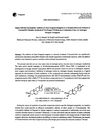
New treatments for hair loss should target eight main causes and use specific plant compounds and peptides for better results.
 October 2021 in “Cosmoderma”
October 2021 in “Cosmoderma” Hair loss can be managed with treatments like minoxidil, finasteride, and others, but there are still gaps in effectiveness and off-label usage is increasing.
[object Object]  July 2021 in “Advances in laboratory medicine”
July 2021 in “Advances in laboratory medicine” Diagnosing sex development disorders requires combining medical history, physical exams, imaging, lab tests, and genetic data.
 May 2003 in “Journal of Investigative Dermatology”
May 2003 in “Journal of Investigative Dermatology” The meeting covered advances in understanding hair growth, causes of hair loss, and potential treatments.
 February 1990 in “Journal of The American Academy of Dermatology”
February 1990 in “Journal of The American Academy of Dermatology” New skin treatments in 1987-1988 showed effectiveness for various conditions, but some had side effects or risks.
December 2022 in “Scientific Reports” Compound 4 is a promising treatment for hair loss with low toxicity.
January 2019 in “Dermatologica Sinica” Dutasteride improved both hair loss and acne in two young men.
 September 2015 in “Korean Journal of Clinical Pharmacy”
September 2015 in “Korean Journal of Clinical Pharmacy” Dutasteride is highly effective for hair loss treatment in Korea, with more side effects than finasteride.
 November 2024 in “Journal of Family Medicine and Primary Care”
November 2024 in “Journal of Family Medicine and Primary Care” 5 alpha reductase inhibitors can cause sexual, cognitive, and muscle side effects, and may slightly increase aggressive cancer risk.
 July 2023 in “Journal of Microbiology and Biotechnology”
July 2023 in “Journal of Microbiology and Biotechnology” Terminalia bellirica extract may help promote hair growth and prevent hair loss caused by testosterone.
May 2024 in “Molecules/Molecules online/Molecules annual” Plant extracts can help prevent hair loss and promote hair growth.
 7 citations,
December 2022 in “Plants”
7 citations,
December 2022 in “Plants” Guava leaf extract may help treat hair loss and protect cells by blocking certain genes and fighting damaging molecules.
 1 citations,
January 1989 in “Handbook of experimental pharmacology”
1 citations,
January 1989 in “Handbook of experimental pharmacology” Anti-androgens can help reduce the effects of male hormones on the skin.
September 2024 in “Fitoterapia” Camellia oleifera seed shell polyphenols and 1,3,6-tri-O-galloylglucose can help treat hair loss by reducing certain hormones and promoting hair growth.
 December 2023 in “Regenerative therapy”
December 2023 in “Regenerative therapy” miRNA-based therapies show promise for treating skin diseases, including hair loss, in animals.
June 2008 in “Drugs & therapy perspectives” Dutasteride effectively treats benign prostatic hyperplasia, improving symptoms and quality of life.
11 citations,
November 2021 in “International journal of molecular sciences” Gut microbes significantly affect brain steroid levels.
1 citations,
December 2022 in “Bioactive Materials” The microneedle patch with quercetin, zinc, and copper effectively promotes hair regrowth for androgenic alopecia.
 January 2025 in “Applied Sciences”
January 2025 in “Applied Sciences” Sulforaphane from broccoli may help treat certain cancers, hormone issues, and hair loss.
 December 2024 in “Molecules”
December 2024 in “Molecules” Bovine milk-derived exosomes may improve skin, hair, gut, brain, and bone health.

Arabica coffee pulp extract may help prevent hair loss and promote hair growth.
 January 2003 in “Humana Press eBooks”
January 2003 in “Humana Press eBooks” Dihydrotestosterone and 5α-Reductase play a role in hair loss and prostate health, and finasteride can increase hair growth in men without affecting sperm production, but it doesn't work for postmenopausal women with hair loss.

Different hair growth phases affect how follicles respond to X-rays, and hormones like testosterone and dihydrotestosterone play a key role in baldness; transplanted hair can grow on bald scalp areas.
 3 citations,
October 2003 in “Annals of Oncology”
3 citations,
October 2003 in “Annals of Oncology” A woman with low thyroid function did not lose her hair during chemotherapy, possibly because her hair follicles were less affected by the treatment.
 45 citations,
February 2005 in “Steroids”
45 citations,
February 2005 in “Steroids” Four new compounds were more effective than finasteride in treating prostate issues and hair loss, with one being 100 times more active and safe for use.
 14 citations,
February 1994 in “Tetrahedron Letters”
14 citations,
February 1994 in “Tetrahedron Letters” Adding cerium(III) chloride to Grignard reagents improves the making of compounds that could treat prostate issues and hair loss.
 9 citations,
November 2011 in “Cytokine”
9 citations,
November 2011 in “Cytokine” Finasteride helps reduce lung inflammation and damage after trauma and infection.
 1 citations,
July 2015 in “Cytokine”
1 citations,
July 2015 in “Cytokine” Finasteride improves immune response and reduces organ damage after trauma hemorrhage in mice.
[object Object]  823 citations,
February 1998 in “Analytical Chemistry”
823 citations,
February 1998 in “Analytical Chemistry” Method detects finasteride in plasma at very low concentrations.
 118 citations,
September 2004 in “Clinics in Dermatology”
118 citations,
September 2004 in “Clinics in Dermatology” Hormones, especially androgens, play a big role in acne, but most acne sufferers don't have a hormone disorder. Hormonal treatments, including birth control pills, can be very effective for women whose acne doesn't improve with regular treatments.























